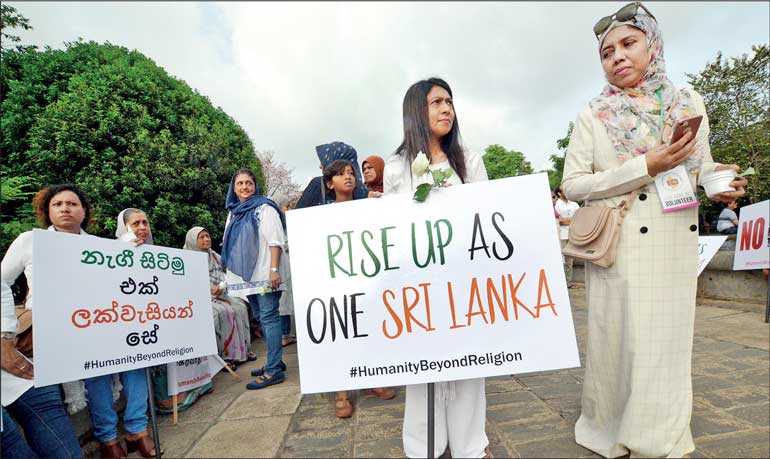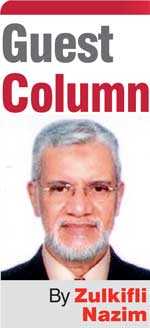Thursday Feb 19, 2026
Thursday Feb 19, 2026
Wednesday, 10 July 2019 00:00 - - {{hitsCtrl.values.hits}}

Islamophobia is not an easy subject to deal with and, therefore, to write about.
To start with, there is the question of definition: Does Islamophobia exist? Is it useful to use the expression ‘Islamophobia’? Shouldn’t we simply talk of ‘discrimination’ or ‘intolerance’? Is it true that the usage of the term Islamophobia can provoke more Islamophobia and hence further victimise Muslims?
Islamophobia is more ‘visible’ today as the delicate international situation has increased the fear and rejection of Muslims. It is practically undisputed that they have also recently taken a particular religious connotation after terrorist attacks by groups claiming to justify their acts under the guise of Islam.
It has given many people an excuse to be anti-Islam and made their intolerance even more visible, in some cases, with physical and verbal harassments. Suspicion, prejudices and intolerance are becoming an everyday reality for many Muslims.
Pardon me for digressing, but I would like to take a moment to touch the hearts of the majority of considerate, genial, gentle and gracious people in all communities.
I am writing this because of a very recent development in one of the private international schools, which is really sad and heart-rending, when a little child had taken a cake on her birthday to her school and the class teacher had created such a ruckus and commotion and prevented the child and her parents from sharing the cake with the other children, openly, blatantly and heartlessly accusing the family of the possibility of the cake being poisoned. The innocent little child was crying her heart out when she could not share the cake she brought into her class room. This should melt hearts and bring tears to the eyes of everyone who reads this.
What has the Ministry of Education done to eradicate and abolish this rising barbaric, savage and uncivilised and fearsome and ferocious behaviour by a small group of extremists in the education system?
We also take this opportunity to thankfully and prominently highlight that the administration of some private, reputed and decent schools and colleges have admonished children and parents and prohibited the use of racial slurs and talks of racism in their educational institutions.
A violation of human rights and a threat to social cohesion
Coming back to our subject in question, Islamophobia can be defined as the fear of or prejudiced viewpoint towards Islam.
Islamophobia is rooted in racism and is a type of racism that targets expressions or perceptions of the quality of being Muslim and matters pertaining to them. Islamophobia is not a new phenomenon but we know that today many Muslim communities in Sri Lanka are experiencing an increasingly hostile environment towards them characterised by suspicion, deep-rooted prejudice, ignorance, and, in some cases, physical and verbal harassment. Whether it takes the shape of daily forms of racism and discrimination or more violent forms, Islamophobia is a violation of human rights and a threat to social cohesion.
The impact on young men and women are incontrovertible when they become targets of Islamophobic attacks and abuse. But, just as importantly, they are also concerned by the general rise in discrimination and prejudice, be it active or passive. Racism and racial discrimination are unacceptable forms of human rights violations anywhere.
Islamophobia cannot be the concern of Muslims alone, for the one who is suffering from widespread discrimination, it is always a denial of dignity, dehumanisation, harassment, disempowerment and an unacceptable form of humiliation, which have been normalised through mass media and party politics.
In this respect, Islamophobia is a threat to our societies and to the values of human rights, pluralist democracy and the valuing of diversity as an asset.
Islamophobia is not an insignificant process, it appears embedded in other forms of racial prejudice and discrimination. It has also shown in an exemplary manner that Islamophobia cannot be analysed nor dealt with outside the wider context of racism and discrimination in our country.
Involvement of youth in community activities and projects alone cannot stand against the dangers of irrational fear and hatred: public institutions and policies have an important role to play; and a reminder that we are all responsible for what we do and also for what we fail to do. In the face of that, it does not always matter if questions do not find an immediate and commonly voiced answer.
Suspicion, prejudice, ignorance, verbal and physical harassment and its consequences on young people brought to the fore and the ongoing, systematic and totally unacceptable discrimination and marginalisation suffered by many minority groups in Sri Lanka.
Discrimination is not something that people grow out of or that you easily recover from. This goes for the victims of Islamophobia, and it is equally true for the perpetrators. The prejudices that children are fed with during their upbringing have a very strong tendency to remain part of their worldview as adults.
There is no guarantee, hence, that wisdom grows with age alone. Quite the contrary: once carved out, a person’s sense of normality, of what can be expected from life, cannot easily be changed. The above statement makes the role of the perpetrator and of the prejudiced majority all the more important. In their historical contexts, it tells us much more about the majority than about the minority.
The fact that Islamophobic representations of Islam or Muslims are the creations of the majority does not mean that the minority cannot be held responsible for their content. We felt that Muslims are partly to be blamed as they are not really able to project a right image of themselves. Because the various hues of Islam being propagated around the world are causing utter chaos and devastation within the Muslim world itself.
Neither can the minority shoulder the responsibility for change to come about. In a relation characterised by imbalance of power, it is simply not possible to expect change to come from the less powerful side. Responsibility for this lies with the majority. The irresponsible behaviour of some of the extremists among the majority community was seen in the Islamophobia Udarata Sandesaya Rally organised by Gnanasara Thero at Bogambara on 7 July [ It was also amusing to see the date of the rally – in Sinhala colloquialism – chaos and mayhem is usually referred to as “jooli hathai” – unbelievable coincidence].
Anyway, accusations against the Muslim community is not just a feeling, it is in fact reinforced hatred, division, insults and abuse against the minority community which has been orchestrated by accursed politicians. It may well be true that more could be done on the side of the Muslims; but the case of wrongdoing does not ever justify another.
In addition there are many who use vitriolic and bitter speeches using innuendos and insinuations with malicious implications and they do it for populist reasons – where a politician who only advocates policies that are popular and appealing to the perceived interests and prejudices of ordinary people, exercising racism in disguise, not caring the slightest about consequences.
Unfortunately the list does not end with the ones that stand out as extreme, or as extremists. There is another category of amongst the mainstream politicians who, because of very minor or personal concerns, do not speak up when it is needed.
Another dimension is what happens when legitimate political criticism is wrongly accused of being racist, and is, therefore, rejected. The wrongdoing it implies when people are forced into defending things for which they cannot be held responsible. It is equally unacceptable to hold any individual Muslim responsible for the acts of the likes of Osama Bin Laden or the ultra-terrorist Zahran Hashim, for that matter.
The role and
responsibility of the media
We have also to examine the role and responsibility of the media. Even without intentional manipulation, insensitive reporting on seemingly trivial matters can promote racism, when multiplied across the media, there is a lot of stereotyped reporting on different groups and issues. Even in this regard, we have not seen law enforcement or even the government taking these black media to task. They seem to be carrying on regardless as if they have been granted an open licence to do whatever they want and to get away with anything and everything.
The frequent episodes of discrimination, the image of Muslims portrayed in the media is negatively affecting young Muslims and it is especially challenging their participation in society and their sense of belonging: young Muslims should not be confronted with the dilemma: am I Muslim or Sri Lankan?
The relation between religion and society is an open question. Extremism, for instance, exists in all religions; it does not constitute the essence of any one religion. As a consequence of this it is a misconception to see Islam only as incompatible with democracy and human rights.
Extremism is a human invention that diverts religion from its humanist path to make it an instrument of power. There is also no single model of either a secular or a religious state.
How then do we safeguard the rights of all members of society? And how do we promote coexistence and dialogue through diversity? Diversity is a reality beyond doubt or discussion. The ordinary layman should be made to understand that diversity is not a threat to cohesion, but a prerequisite!
Cultural diversity can bring about a strengthening of peace, through knowledge, recognition and development of all cultures, whether they originate and still exist in Sri Lanka or originate from geographical areas outside Sri Lanka.
Our country must be a place where everybody is respected and valued: this is the general opinion of good and likeminded people, the basis of a pluralistic society and genuine democracy.
Building peaceful interfaith dialogue and mutual understanding
When we share experiences and talk about challenges and difficulties, it is important that we go beyond and see how we can overcome these challenges. The solutions are many. Only by a strong commitment and cooperation between different faiths and communities can we build a peaceful interfaith dialogue and mutual understanding. The diversity of experiences must be taken into account.
Buddhists, Hindus, Christians, Muslims... believers or non-believers, we, the inhabitants of our beautiful land Sri Lanka – must make sure that this is put into action every day. This can be done by our motivation and engagement to a cause: build and strengthen a multicultural Sri Lanka where diversity is seen as a richness. It is fundamental that young people take part in this process, we are the present, not only the future. A better future starts from our commitment and active participation at a community, local and national level.
Make sure that we never again face racism or other forms of discrimination and to ensure the 22 million citizens living in this country have a genuine and pluralistic democracy.
We have to have one voice with a strong commitment: “Never again!”
And finally a thought to ponder: In one of his letters Thomas Jefferson remarked that in matters of religion, “the maxim of civil government” should be reversed and we should rather say, “divided we stand, united, we fall.”
(The writer counts over 50 years in the insurance industry and is an Associate of the Chartered Insurance Institute (London) and also holds the title of Chartered Insurance Practitioner; as well as an Associate of the Insurance Institute of India. He can be reached via email at [email protected].)